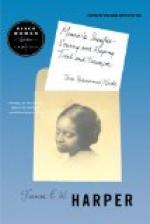“I think I understand you,” said Camilla; “and although I tremble for you in the present state, yet you cannot do better than live out the earnest purpose of your life. I feel that we owe a great debt to the colored race, and I would aid and not hinder any hand that is ready to help do the needed work. I have felt for many years that slavery was wrong, and I am glad, from the bottom of my heart, that it has at last been destroyed. And what are your plans, Louis?”
“We are going to open a school, and devote our lives to the upbuilding of the future race. I intend entering into some plan to facilitate the freedmen in obtaining homes of their own. I want to see this newly enfranchised race adding its quota to the civilization of the land. I believe there is power and capacity, only let it have room for exercise and development. We demand no social equality, no supremacy of power. All we ask is that the American people will take their Christless, Godless prejudices out of the way, and give us a chance to grow, an opportunity to accept life, not merely as a matter of ease and indulgence, but of struggle, conquest, and achievement.”
“Yes,” said Camilla, “what you want and what the nation should be just enough to grant you is fair play.”
“Yes, that is what we want; to be known by our character, and not by our color; to be permitted to take whatever position in society we are fitted to fill. We do not want to be bolstered and propped up on the one hand, nor to be crushed and trampled down on the other.”
“Well, Louis, I think that we are coming to that. No, I cannot feel that all this baptism of fire and blood through which we have passed has been in vain. Slavery, as an institution, has been destroyed. Slavery, as an idea, still lives, but I believe that we shall outgrow this spirit of caste and proscription which still tarnishes our civilization, both North and South.”
Chapter XVIII
After spending a few weeks with Camilla, Louis resolved to settle in the town of L——n, and as soon as he had chosen his home and made arrangements for the future, he sent for Ellen, and in a few days she joined her dear children, as she called Louis and Minnie. Very pleasant were the relations between Minnie and the newly freed people.
She had found her work, and they had found their friend. She did not content herself with teaching them mere knowledge of books. She felt that if the race would grow in the right direction, it must plant the roots of progress under the hearthstone. She had learned from Anna those womanly arts that give beauty, strength and grace to the fireside, and it was her earnest desire to teach them how to make their homes bright and happy.




